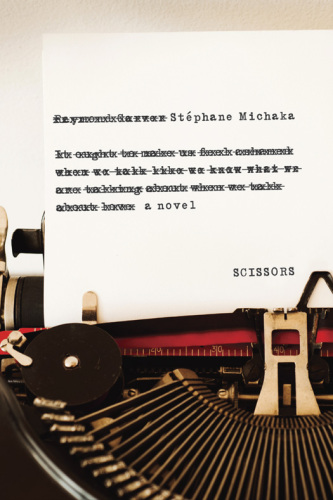
Scissors
A Novel
کتاب های مرتبط
- اطلاعات
- نقد و بررسی
- دیدگاه کاربران
نقد و بررسی

June 17, 2013
Based on the relationship between Raymond Carver and his editor, this novel from Michaka plods ponderously through a morass of sources (duly noted in the bibliography) in order to offer an unremarkable reconstruction of the difficult and critical period before the acclaimed short-story writer made it to the big time. The alternating first-person monologues, featuring Carver, his editor, and Carver’s first wife, Maryann Burk (“Marianne”), are laborious and stilted. The conversational quality remains elusive, so redundant are the dialogues and so monothematic the characters’ preoccupations. Interspersing a few (fictional) Carver short stories into the mix is the final blow, obliterating any lingering illusion of a narrative. This isn’t to say the novel fails as an enlightening foray into the already notorious dynamic between a talented writer and his arrogant, conceited editor. What writer hasn’t dreamed of telling a particularly ruthless editor his cuts amount to “Two and a half pages of con artistry. Some cunning tricks to take the reader in.... A cold wind blows through it from beginning to end.” Michaka’s conclusion—that Carver’s success may not have been worth it—is valid; too bad his argument is so lifeless.

June 15, 2013
Loosely based on the life of Raymond Carver, this book is more than a love triangle--it's a love polygon?--of a writer, his work, his editor, his significant other and alcohol. Scissors is the nickname of Raymond's editor, Douglas, a man with such a high opinion of himself that he might be divine. Raymond is married to Marianne. They married young and were parents before they knew it. Burdened with debt, working dead-end jobs, Raymond and his wife sacrifice so Raymond can write, and he does, but he drinks, too. When Raymond's work finds its way to Douglas' desk, lives are changed: Douglas', Raymond's, Marianne's and readers'. As Douglas observes, "If Raymond hadn't existed, I would have invented him." Raymond is that good and that important to Douglas' sense of his mission. But Douglas cuts so much from Raymond's work that it is unrecognizable. As Raymond and Douglas exchange letters and finally meet, as they struggle over Raymond's work, the novel becomes a slippery study of writing and re-writing. Raymond's a mess; as he becomes successful, he feels fraudulent. Is the work his or not? Four short stories appear in the novel. Douglas' savage cutting of the first two is dramatized exquisitely. The book's weakness is that one of the included stories is too good an imitation of bad writing. Raymond's life, Douglas' life and the "lives" of the later stories are inextricably linked in unexpected ways. The book's debts to its famous subjects are repaid. It is a measure of the book's success that readers need no knowledge of its famous subjects to appreciate it. Daring and impressive.
COPYRIGHT(2013) Kirkus Reviews, ALL RIGHTS RESERVED.

September 1, 2013
Michaka's third novel is a fictionalized account of the latter part of the life of fiction writer Raymond Carver. Using four changing points of view, including Carver's, as well as invented Carver-like stories, the author illustrates the personal struggle of this literary giant. Shifting narratives present different aspects of Carver's life up to and even after his death. Through this narrative interplay, we experience the author's alcoholism, his challenges with his editor, the breakup of his first marriage, and his reconstruction of an alcohol-free self in his second marriage. Michaka's ingenious use of fictionalized fiction with the inclusion of pseudo-Carver stories is an artful attempt to channel Carver without trampling on his literary legacy. VERDICT Was Carver's work really his own? Did his editor cut his work so heavily as to erase the essence of what it was, or was this reduction the actual act of creating the real Raymond Carver? This book asks a lot of the reader yet delivers a unique experience of the use of fiction as it provokes that burning central question.--Henry Bankhead, Los Gatos Lib., CA
Copyright 2013 Library Journal, LLC Used with permission.

July 1, 2013
Raymond and his wife, Marianne, are struggling personally and professionally. Ray is writing short stories full-time, hoping to be published, while Marianne holds down three minimum-wage jobs to support their family. Their marriage is volatile, as Raymond battles alcoholism and Marianne, deeply unhappy, struggles with frustration. When Raymond meets Douglas, an editor, life for everyone takes a dramatic turn. Douglas, known as Scissors, ruthlessly edits Ray's work, bringing both author and editor commercial success but causing questions to linger regarding the authenticity of the stories. Has Douglas enhanced or distorted Ray's work? And what price is Ray willing to pay to find professional success? Told from multiple viewpoints and including four of Ray's stories, Scissors is a detailed and intimate exploration of one man's life. Based on the life of Raymond Carver, Michaka's version takes readers deep into the creative life. Funny, sad, and deeply compassionate, Scissors is a unique and engaging novel that ponders life, love, and the importance of believing in ourselves and in our chosen work.(Reprinted with permission of Booklist, copyright 2013, American Library Association.)

























دیدگاه کاربران